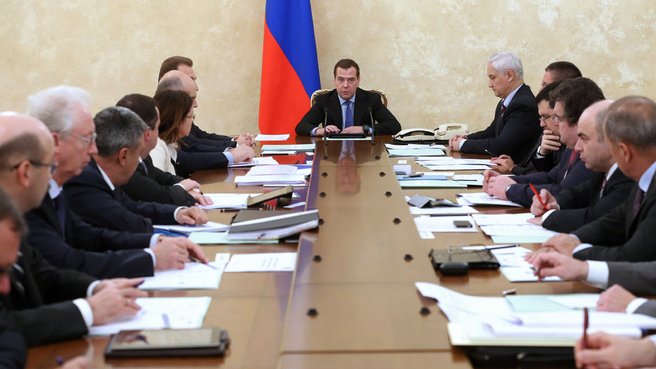“The increasing transparency of the Russian financial system must strengthen its positions globally and, I believe, will allow us to set new objectives.”
Dmitry Medvedev’s opening remarks:
Some time ago we have agreed to discuss the current situation and the shared objectives of the banking community, the Bank of Russia and the executive authorities.
I will not speak at length about the current situation as it is more or less clear to everyone. In any case, our joint efforts to improve the regulatory base will continue. On September 1, a single regulator was established at the Bank of Russia. It was given all powers under the law on the regulation and oversight of non-banking financial institutions, something that we have discussed and planned just recently.
Today we will discuss initiatives that are expected to make our national banking system more robust. At a recent meeting with representatives of the world’s leading banks in St Petersburg we talked about the banking community’s readiness to act on the Basel Committee’s recommendations, which are set forth in the Basel II and Basel III accords.
On January1, the Bank of Russia will introduce the new rules on capital requirements and minimum capital adequacy for lending institutions. We believe that this measure will contribute to the stability of the Russian banking system.
I also would like to mention a draft law which aims to improve the deposit insurance system by introducing differentiation of banks’ contributions to this system. It is proposed that we switch to a more differentiated model based, to a greater extent, on the level of risk associated with a bank. This move is also expected to make the system more robust and preclude actions that will pose a threat to the system’s stability: I mean that involvement in risky transactions will come at a cost to banks.
Work is underway to develop legal mechanisms for precluding bankruptcy and ensuring financial rehabilitation of problem lending institutions. Currently, these measures are provided for in the bank rehabilitation law, which was enacted during the credit crunch as a temporary law to remain in force until the end of 2014. Today we need to decide what other measures should be taken to streamline and consolidate the financial rehabilitation mechanisms for lending institutions.
The regulatory system should provide incentives for striking a reasonable balance between the interests of lending institutions and their clients, ensure the protection of depositors’ rights and, of course, bring down the costs and improve corporate governance at banks, and certainly ensure that loans are more affordable to companies and individuals as they pay normal interest rates, something that we are all interested in.
In general, the increasing transparency of the Russian financial system must strengthen its positions globally and, I believe, will allow us to set new objectives and deliver on our plans to create an international financial centre. Today we will take part in another event devoted to this issue.
<…>











